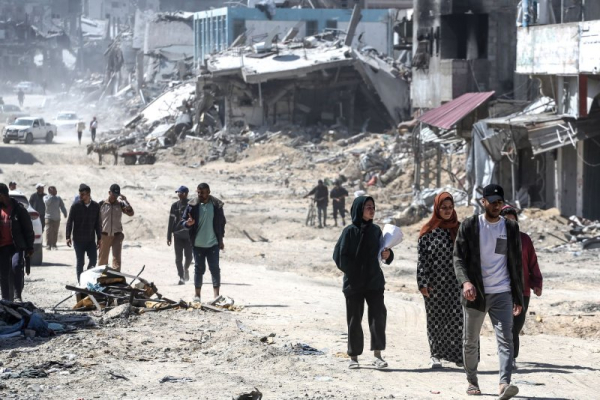
Israel Defense Forces instructed residents of Gaza City, an estimated 250,000 people, on Wednesday to leave what it called a “dangerous combat zone” and move southwards to central areas of the Palestinian enclave. Palestinian seen here inspect destroyed residential buildings, after the Israeli military withdrew most of its ground troops from the southern Gaza Strip. File Photo by Ismael Mohamad/UPI | License Photo
Israel Defense Forces told all residents of Gaza City, an estimated 250,000 people, to leave what it called a “dangerous combat zone” and move southwards to central areas of the Palestinian enclave.
Leaflets dropped from the air on Wednesday directed residents to use two roads designated as safe routes to evacuate to humanitarian zones in Deir al-Balah and al-Zawaida to avoid being caught up in IDF combat operations targeting Hamas. Advertisement
Six months after declaring it had defeated Hamas in northern Gaza, the Israeli military has in the past two weeks gone back into several areas of Gaza City where it says Hamas and Palestinian Islamic Jihad fighters have re-established themselves.
“Gaza City will remain a dangerous combat zone,” the Israeli military said in a statement published on social media that promised Palestinians who used the approved routes would be able to evacuate “quickly and without inspection.” Advertisement
People were later seen moving along roads out of the city after the flyer drop, according to the BBC which said the IDF had clarified that the communication was recommending residents leave, rather than ordering them to do so.
However, some residents who wanted to leave remained trapped due to the intensity of the fighting, said the Palestinian Red Cross.
“The information coming from Gaza City shows residents are living through tragic conditions. [Israeli] occupation forces continue to hit residential districts, and displace people from their homes and refuge shelters,” the Red Cross said.
Many have been already been displaced multiple times, seeking shelter in schools and relatives’ homes, only to be forced to flee the fighting again.
The U.N. agency for Palestinian refugees said people were being continuously forced to flee in search of sanctuary they never find in what it called “an exodus on repeat.”
“As new evacuation orders hit Gaza City, families face more displacement with nowhere safe to go,” UNRWA wrote on its account on X.
The U.N Human Rights Office strongly criticized similar orders Sunday instructing residents of the city’s At Tuffah and Ad Daraj neighborhoods to immediately evacuate to areas west of Gaza City which were then targeted by airstrikes and then the next day ordering them, together with residents of other areas of the city, to further evacuate to Deir al Balah which it said was “seriously overcrowded” with people displaced from other areas of Gaza. Advertisement
“The U.N. Human Rights Office is appalled as IDF once more orders residents of Gaza City, many of whom have been forcibly displaced multiple times, to evacuate to areas where IDF military operations are ongoing and where civilians continue to be killed and injured,” it said.
The latest clashes in the city’s Shajaiye, Tel al-Hawa, Al-Daraj and Tuffah districts, following military operations inside the Jabalia Refugee Camp in May and an assault in March on the Al-Shifa Hospital which the IDF said was being used by Hamas as a base, form part of a pattern of Israeli forces pulling out of areas after clearing them of Hamas only to have to retake them all over again.
Israel’s refusal to allow any form of self-government in Gaza, far from stamping Hamas out, has led to a power vacuum situation within which the group is able to continuously reorganize, according to analysts.
Hamas warned IDF operations in Gaza City could impact the latest round of cease-fire talks between the intelligence chiefs of Egypt, the United States and Israel and hosted by the Qatari Prime Minister, which got underway Wednesday.
Israeli Prime Minister Benjamin Netanyahu said Israel was committed to finding a resolution, but only provided it not not overstep its “red lines.” Advertisement